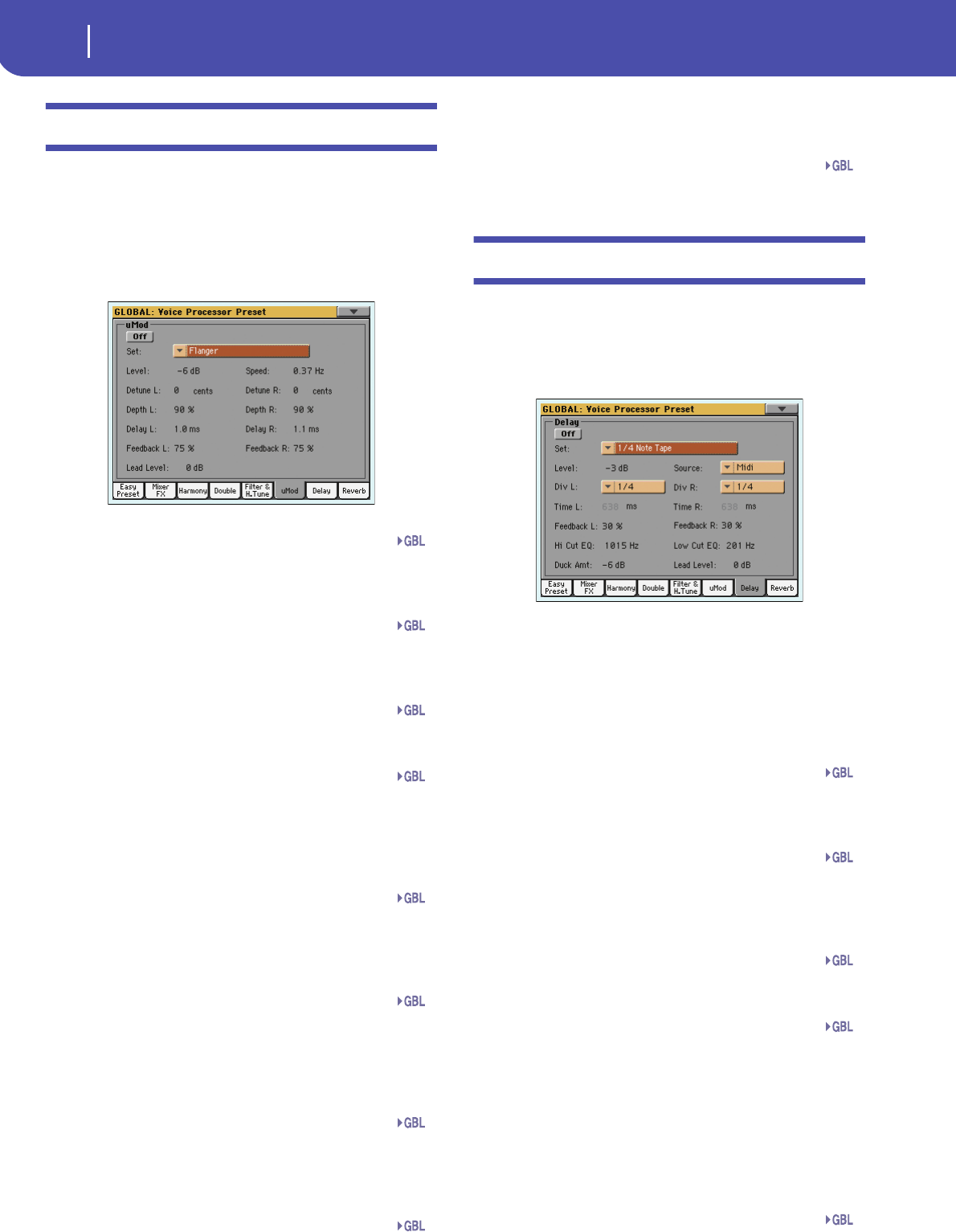
104
Voice Processor
Voice Processor Preset: μMod
Voice Processor Preset: μMod
μMod is short for micro-modulation. The µMod effect is capable
of creating many different sounds that range from subtle but
lush thickening to creatively destructive. It uses a combination of
stereo pitch shifting (Detune), small amounts of stereo delay
(Delay), and then a complex path of filtering, feedback, and
modulation. µMod does a faithful job of emulating classic
detune, chorus, flange and thickening sounds.
(μMod) On/Off
This button allows enabling/disabling of the µMod block. It is
the same control found in the “Easy Preset” page.
Set
Use this menu to choose a pre-programmed µMod Set. This cor-
responds to the option selected in the “Easy Preset” page.
Level
Sets the mix level for the µMod effect.
Speed
This setting sets how fast the delay time modulation occurs. In
order for this to be audible, the depth amount parameter has to
be nonzero. The setting range is 10.00 Hz (very fast) to .05 Hz
(very slow).
Detune L/R
Applies a small amount of pitch shift to the left or right sides
independently. This setting is shown in cents and the maximum
is +/- 25 cents.
Depth L/R
These set the amount of modulation of the delay time for the left
and right delays. If one delay is set to 10mS, for example, a set-
ting of 50% will vary the delay time between 15mS and 5mS at
the rate set by the Speed parameter.
Delay L/R
Sets the left and right delay times. Up to 50 ms of delay is avail-
able on the left and right delay lines to create effects from flange
to slapback.
Feedback L/R
Re-introduces a portion of the audio output signal of the µMod
block back to the input to create flanges, tube and chorus effects.
Values above 90 add a high amount of gain and cause distortion
and higher audio levels.
Lead Level
Level of the Lead voice mixed with the effect.
Voice Processor Preset: Delay
The delay effect is a configurable echo. You can control how far
apart the echoes occur (Delay Time), and whether the echoes
fade out quickly or slowly or build on themselves. In addition,
there are filtering and stereo controls that allow you to create
many popular delay sounds.
Delays can be typically be categorized into the two listed catego-
ries below:
Short Delays: Initial reflections, Slaps
Long Delays (max stereo delay is 2500 ms or 2.5 sec.): Monotaps,
Stereotaps, Syncopated taps, Ping-pongs (delays travelling from
left to right).
(Delay) On/Off
This button allows enabling/disabling of the Delay block. It is the
same control found in the “Easy Preset” page.
Set
Use the soft knob assigned to this parameter to choose a pre-
programmed delay style you like. This corresponds to the option
selected in the “Easy Preset” page.
Level
Sets the mix level for the delay effect.
Source
Determines which of the two methods you want to use to set
delay times. These include:
Time This allows you to set the exact delay time for the
left and right delay lines manually with the Time
L and Time R controls.
MIDI The unit can be set to derive its delay times from
incoming MIDI clock signal.
Div L/R
When the source is set to MIDI, these parameters divide the
tempo into even (e.g. 1/4 or quarter notes) or syncopated sub-
VPp
VPp
VPp
VPp
VPp
VPp
VPp
VPp
VPp
VPp
VPp
VPp
VPp
VPp


















